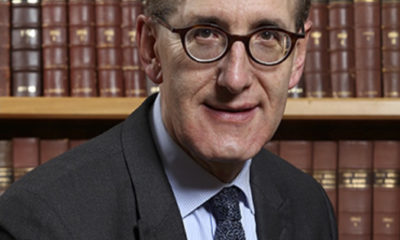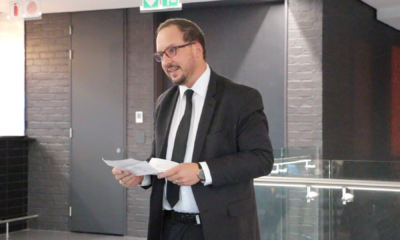
OpEds

Omicron: hoping for a storm in a teacup
An avalanche of panic calls, contact questions, and quarantine-bound disappointed families was certainly not what I expected in the last week of November. I have, once again, awoken this morning to a stream of positive COVID-19 test results.
Every day this week has been similar. This after a month of not a single COVID-19-positive result detected through my practice.
COVID-19 has been described as a pandemic of disease, economic challenge, and patient anxiety, and it’s always that anxiety that we, family medical practitioners, have grappled with at the start of a new wave.
This community anxiety is applaudable because it reflects the deep respect that this virus has gained. The trauma our community has experienced over the past 22 months has scarred us. It’s this deep respect that, in fact, propels our community to contain COVID-19 outbreaks and directly act to save lives now.
However, anxiety needs to be transformed into evidence-driven knowledge to be productive. Knowledge empowers patients to make informed choices about socialising, travelling, and even the symptoms to look out for in their bid to keep safe and still live “normally” during a COVID-19 surge.
Imparting this knowledge is the most time-consuming occupation for my GP colleagues and myself at the moment. We have, once again, invested deeply in responding to every question, sharing sound information, and finding innovative ways to educate our community appropriately.
The mental fatigue from the formidable task of caring virtually for dozens of COVID-19-positive patients is balanced by the sense of worth in making a dent in this pandemic.
I recognise that as much as long workdays and being a distracted father may not be the best input I could give my family now, these efforts may truly assist a large number of other families to get through this unexpected twist at the end of this challenging year. Each of the GPs in our community has expressed similar sentiments.
The COVID-19 sky isn’t so dark this time round. We’re familiar with managing COVID-19 at home. I think back to June 2020 with its grocery sterilisations, runs on hydroxychloroquine, debates about whether masks actually matter, and even COVID-19-toe queries, and realise how far we’ve come.
We now know what evidence-based vitamin regimens to give patients early on in the disease. We know how to track their vital metrics at home. We know what signs of deterioration to look out for, and we have a good idea how to prevent the spread of infection.
The Omicron finding has been trying. We are now dealing with an “extra-novel” coronavirus. Virologists have warned that with more than 50 new mutations, more than 30 of which are on the spike protein by which the virus enters the human cell, we can predict serious disease and a resultant escalation in hospitalisations and death.
The thought of once again conducting midnight rushes of hypoxic patients to hospital, running daily blood tests on serious patients at home, and counselling patients after regrettable losses is overwhelming.
However, our experience this week on the ground has been the saving grace so far. Our community is largely vaccinated, unlike the majority of South Africans who unfortunately aren’t.
Amidst all the speculation as to whether vaccines work against the Omicron strain, we are seeing vaccinated patients easily contracting COVID-19, even if they have had a previous infection in the past three months.
Thankfully, though, they aren’t becoming particularly ill.
Although routine COVID-19-positive swabs aren’t undergoing genomic sequencing to establish whether or not they are the Omicron strain, the massive uptick in cases with a concomitant community finding of a new variant suggests they are.
The juxtaposition of these facts implies that either Omicron is, in fact, mild, or that vaccines are, indeed, protective. It’s too early to predict that this surge of Omicron will be mild, but if you are a clinical optimist, the prospects are looking good.
I have experienced a flood of questions this week requiring a recap of the basic facts.
* Exposure to a COVID-19-positive individual still requires a 10-day quarantine. A negative test at five days doesn’t shorten that time;
* Exposure is defined as contact within two metres. Masks are protective, but in closed environments, masks don’t obviate the need to quarantine unless the exposure is both outdoors and distanced;
* There are no new novel treatments for early COVID-19 infection. Vitamins remain the mainstay of early treatment, and steroids are largely contraindicated in the first week. (Regeneron, molnupiravir, and ritonavir are all new effective treatments for early COVID-19, but aren’t yet available in South Africa.);
* Isolation for infected patients remains 10 days;
* Secondary contacts don’t need to quarantine; and
* Vaccinated individuals who are exposed to positive patients need to quarantine as well.
I believe the next two weeks will be the most telling time for our community in this pandemic thus far. We have all worked tirelessly to get ourselves vaccinated, and we are desperate to continue our former lifestyles, even alongside COVID-19.
I’m filled with optimism, and hope that for those of us who have been vaccinated, the worst of this new strain of COVID-19 will be a disruption of our holiday and perhaps the experience of a contagious flu upon some of us.
However, until we know more, and while so many of the South African population is unvaccinated, it’s vital that we pull up our masks, socialise safely, and test appropriately over this peak.
I look forward to the next relaxation of these measures, a population greater vaccinated, and a less daunting situation next year.











Rod
December 6, 2021 at 9:53 pm
Interesting. The top experts all say this variant is mild, yet you’re not sure. This is how viruses end their peak. Africa north of South Africa has an almost zero covid mrna vaccine rate, and they’re doing okay. See Florida in the USA and Sweden. One gets the vaccine, yet can still contract covid and transmit covid and have a high viral load. Thus the vaccine does not provide protection, and your fear mongering is questionable. The Torah says we should be confident not fearful. With covid turning into a seasonal flu, vaccines are not now necessary with herd immunity. Yearly, people choose whether to get a flu jab, or not.
Nene
December 7, 2021 at 7:37 am
Thanks for this update Dr Israel. I also contracted the virus and on my day 6 of isolation. I am happy that I am fully vaccinated so it seems to help as my flu symptoms are gone🙏🏾